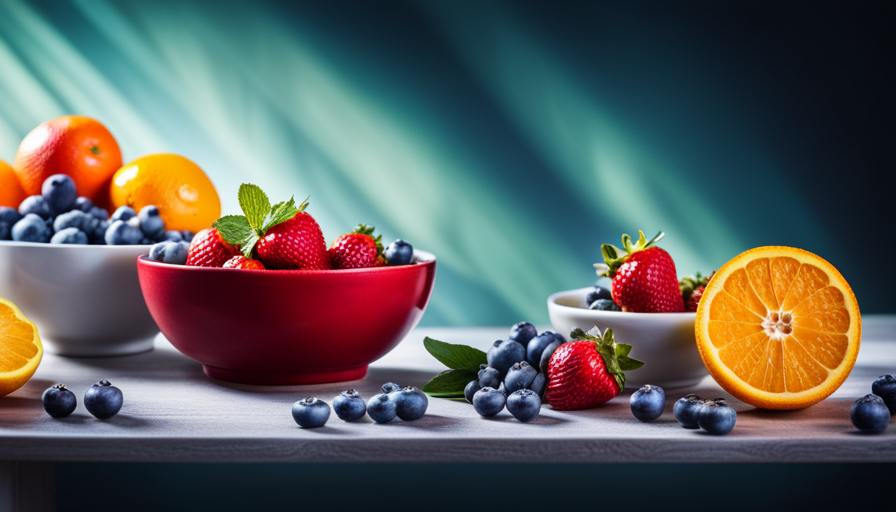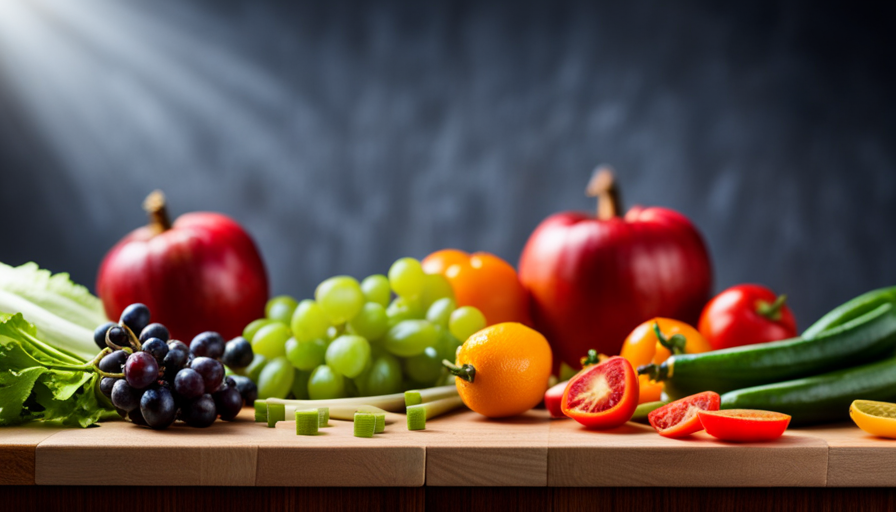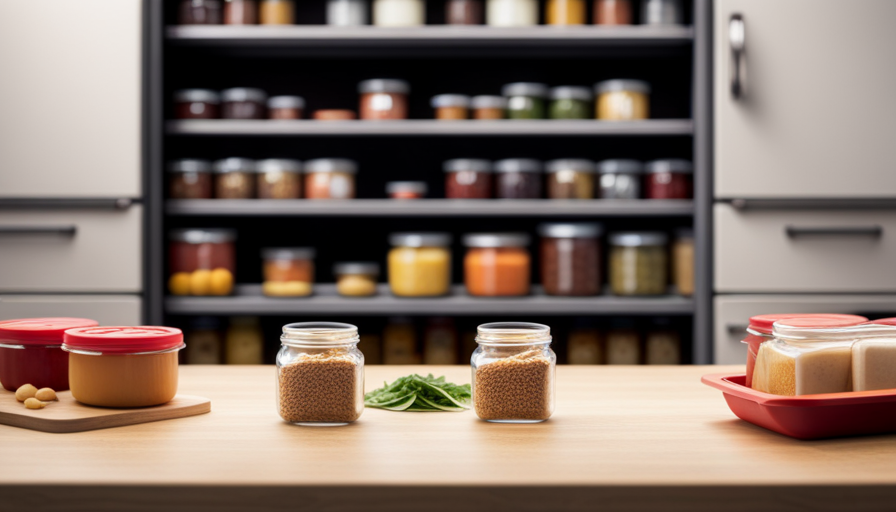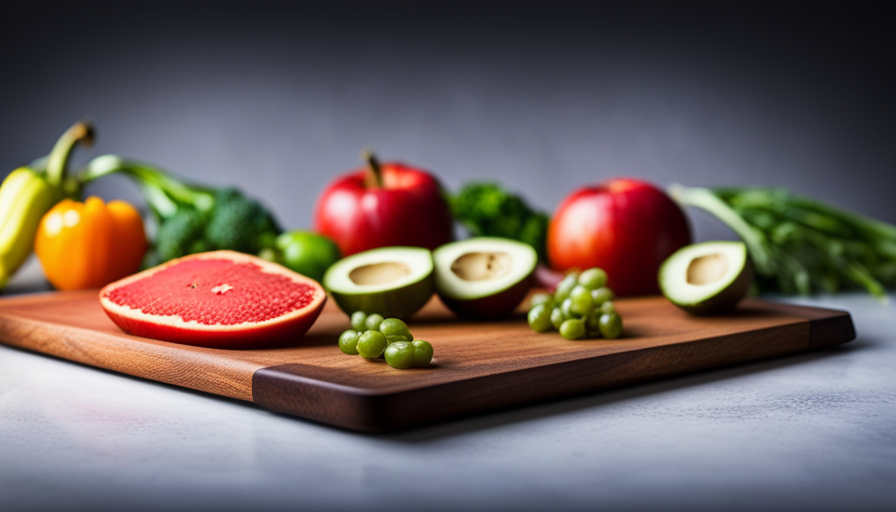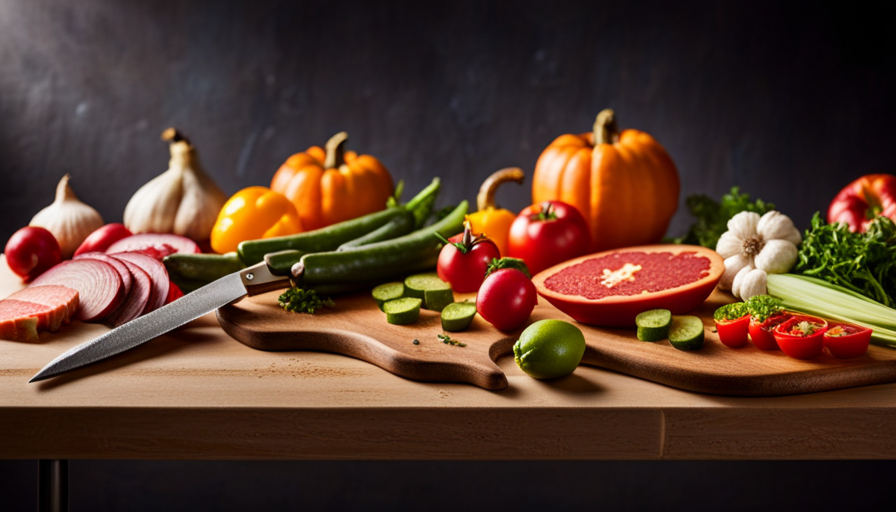In the realm of nutrition, there are numerous diets and lifestyles available to explore. One that has surged in popularity in recent times is the raw food vegan diet. Being a raw food vegan, I have personally experienced the amazing advantages of this eating approach.
But one question that often arises is, how many calories do raw food vegans get a day?
To truly understand the answer, it is important to first grasp the basics of raw food veganism. This lifestyle emphasizes the consumption of unprocessed, plant-based foods in their natural state. This means that fruits, vegetables, nuts, and seeds become the foundation of every meal.
The calorie intake of raw food vegans can vary depending on individual needs and preferences. However, the focus is on consuming nutrient-dense foods that provide a high amount of vitamins, minerals, and antioxidants. These foods are not only low in calories, but they also nourish the body on a cellular level.
In this article, we will delve into the calorie intake of raw food vegans, explore nutrient-dense foods that can help meet these needs, and provide tips for increasing calorie intake while maintaining a raw food vegan lifestyle.
So let’s dig in and uncover the secrets to thriving on a raw food vegan diet!
Key Takeaways
- Raw food vegan diets can vary in calorie intake depending on individual needs and preferences.
- Fruits, vegetables, nuts, and seeds are the foundation of every meal for raw food vegans.
- Transitioning to a raw food vegan diet can be a gradual process.
- Balancing macronutrients is important in maintaining a well-rounded raw vegan diet.
Exploring the Raw Food Vegan Diet
If you’re curious about the raw food vegan diet, you might be wondering how many calories they typically consume in a day. The raw food vegan diet is based on the consumption of unprocessed, plant-based foods that haven’t been heated above 118°F (48°C).
Some people believe that this diet can lead to nutrient deficiencies, but research suggests otherwise. In fact, studies have shown that raw food vegans can meet their nutritional needs by eating a variety of fruits, vegetables, nuts, and seeds. These foods are rich in vitamins, minerals, and antioxidants, which can help prevent chronic diseases and promote overall health.
Contrary to popular belief, raw food vegans can also consume an adequate amount of calories. Fruits like bananas, dates, and avocados are high in natural sugars and healthy fats, providing a good source of energy. Nuts and seeds, such as almonds and chia seeds, are also calorie-dense and can be included in the diet. Additionally, raw food vegans often incorporate raw grains, such as sprouted quinoa or buckwheat, into their meals.
Understanding the basics of raw food veganism goes beyond just calorie intake. It involves exploring the health benefits, debunking myths, and learning about the various ways to prepare and enjoy raw plant-based foods.
Understanding the Basics of Raw Food Veganism
To truly understand the fundamentals of raw food veganism, you must delve into the core principles and embrace a lifestyle centered around nourishing your body with unprocessed plant-based nourishment. Raw food veganism is not just a diet, but a way of life that focuses on consuming foods in their most natural state, without cooking or processing.
This means that raw food vegans primarily consume fruits, vegetables, nuts, seeds, and sprouted grains.
Transitioning to a raw food vegan diet can be a gradual process. It’s important to start incorporating more raw foods into your meals and gradually reduce your intake of cooked or processed foods. Raw food vegan meal ideas are abundant and diverse, ranging from simple salads and smoothies to more elaborate dishes like raw vegan lasagna or sushi made with jicama and vegetables instead of rice.
By consuming a raw food vegan diet, you can benefit from increased energy levels, improved digestion, and enhanced nutrient absorption.
The next section will explore the many benefits of a raw food vegan lifestyle, including its impact on overall health and well-being.
The Benefits of a Raw Food Vegan Lifestyle
Embracing a raw food vegan lifestyle can lead to increased vitality, improved digestion, and better nutrient absorption. Raw food vegan recipes are abundant and can be both delicious and nutritious. Transitioning to a raw food vegan diet may seem challenging at first, but it can offer numerous benefits for your health and well-being.
Firstly, raw food vegan recipes are typically packed with fresh fruits, vegetables, nuts, and seeds, which are rich in essential vitamins, minerals, and antioxidants. These nutrients can help boost your immune system, promote healthy skin, and support overall vitality.
Secondly, the raw food vegan diet emphasizes consuming foods in their natural state, which helps preserve their natural enzymes. These enzymes aid in digestion, ensuring that the body efficiently breaks down and absorbs nutrients from the food we eat.
Lastly, raw food veganism encourages the consumption of whole foods, which are minimally processed and free from additives and preservatives. This promotes better nutrient absorption and reduces the intake of unhealthy fats, sugars, and artificial ingredients.
Transitioning to a raw food vegan lifestyle can have many positive effects on your health. By incorporating raw food vegan recipes into your diet, you can increase your energy levels, improve your digestion, and enhance your overall well-being.
In the next section, we will explore the calorie intake of raw food vegans.
The Calorie Intake of Raw Food Vegans
Transitioning to a raw food vegan lifestyle, how do raw food vegans ensure they meet their daily calorie requirements while consuming nutrient-dense foods? The raw food vegan diet consists of unprocessed, plant-based foods that aren’t cooked above 118 degrees Fahrenheit, which helps preserve their natural enzymes and nutrients. Although raw food vegans mainly consume fruits, vegetables, nuts, and seeds, it’s still possible to meet their calorie needs.
Raw food vegans often rely on high-calorie fruits like bananas, dates, and avocados to provide them with the energy they need. These fruits aren’t just delicious but also packed with essential nutrients and healthy fats. Additionally, nuts and seeds are excellent sources of calories for raw food vegans. They’re rich in protein, healthy fats, and vitamins, making them a valuable addition to a raw food vegan diet.
Despite the misconception that raw food vegans may struggle to meet their calorie requirements, research shows that this lifestyle can provide sufficient energy. Raw food veganism has been associated with numerous health benefits, including weight loss, improved digestion, increased energy levels, and reduced risk of chronic diseases.
Transitioning to a discussion about nutrient-dense foods for raw food vegans, it’s important to note that meeting calorie requirements is crucial for overall health and wellbeing.
Nutrient-Dense Foods for Raw Food Vegans
Including nutrient-dense foods in my raw vegan diet ensures I receive a wide range of vitamins, minerals, and antioxidants to support my overall health and well-being. As a raw food vegan, it’s important to focus on high protein options and essential fatty acids.
Some nutrient-dense foods that are excellent sources of protein for raw food vegans include sprouted legumes, such as lentils and chickpeas, as well as nuts and seeds like almonds and chia seeds. These foods not only provide protein but also contain essential amino acids necessary for optimal health.
In addition to protein, raw food vegans need to ensure they’re getting enough essential fatty acids. Good sources of these healthy fats include avocados, coconuts, and flaxseeds. These foods are rich in omega-3 and omega-6 fatty acids, which are important for brain function, heart health, and reducing inflammation in the body.
By incorporating these nutrient-dense foods into my raw vegan diet, I can ensure that I’m meeting my body’s needs for protein and essential fatty acids. This helps me maintain a balanced macronutrient intake on my raw food vegan diet, which I’ll discuss further in the next section about balancing macronutrients on a raw food vegan diet.
Balancing Macronutrients on a Raw Food Vegan Diet
Maintaining a well-rounded raw vegan diet is like orchestrating a symphony, where the balance of macronutrients plays a crucial role in harmonizing the body’s nutritional needs.
Balancing protein intake and managing carbohydrate sources are key components of a successful raw food vegan diet. To ensure sufficient protein intake, raw food vegans can incorporate nutrient-rich foods such as sprouted legumes, seeds, and nuts into their diet. These plant-based sources aren’t only packed with protein but also provide essential amino acids necessary for optimal bodily functions.
In terms of managing carbohydrate sources, raw food vegans can rely on fruits, vegetables, and sprouted grains. These foods aren’t only high in carbohydrates but also offer a wide range of vitamins, minerals, and fiber, which are important for overall health and digestion.
Incorporating a variety of these protein and carbohydrate-rich foods into a raw vegan diet helps to ensure that the body receives the necessary macronutrients for optimal functioning.
Transitioning into the subsequent section about ‘meal planning for raw food vegans,’ it’s important to have a clear understanding of the macronutrient balance in order to create well-rounded and nutritious meals.
Meal Planning for Raw Food Vegans
Planning meals as a raw vegan can be an exciting and creative process, allowing me to explore a wide variety of delicious and nutritious plant-based options. When it comes to meal planning, there are several strategies that can help ensure a well-balanced and nutrient-rich diet.
First and foremost, it’s important to include a variety of nutrient-rich ingredients in every meal. This includes a wide range of fruits, vegetables, nuts, seeds, and sprouted grains. By incorporating a diverse array of plant-based foods, I can ensure I’m getting a wide range of essential vitamins, minerals, and antioxidants.
Another helpful planning strategy is to focus on combining different food groups. For example, pairing fruits with nuts or seeds can provide a good balance of carbohydrates, healthy fats, and protein. Including leafy greens in my meals is also important, as they’re packed with essential nutrients.
To transition into the subsequent section about tips for increasing calorie intake on a raw food vegan diet, it’s important to note that while raw vegan meals can be nutrient-dense, they can also be lower in calories compared to cooked meals. Therefore, it’s important to explore ways to increase calorie intake while still adhering to a raw food vegan diet.
Tips for Increasing Calorie Intake on a Raw Food Vegan Diet
One effective way to boost calorie intake on a raw vegan diet is by incorporating energy-dense foods like avocados, coconut, and nuts into daily meals. These nutrient-rich foods not only provide a substantial amount of calories, but they also offer essential vitamins, minerals, and healthy fats that are beneficial for overall health.
To increase your calorie intake on a raw food vegan diet, consider the following tips:
-
Include more avocados in your meals. Avocados are a great source of healthy fats and can be added to smoothies, salads, or used as a spread.
-
Incorporate coconut into your diet. Coconut oil, coconut milk, and shredded coconut are all excellent sources of energy and can be used in various recipes.
-
Snack on nuts and seeds. They’re high in calories and provide a good amount of protein as well. You can enjoy them on their own or add them to salads, trail mixes, or homemade energy bars.
-
Experiment with dried fruits. Dates, figs, and raisins are all natural sweeteners that can be used in desserts, smoothies, or as a topping for breakfast bowls.
By incorporating these nutrient-dense foods into your raw vegan diet, you can easily increase your calorie intake while still enjoying a variety of delicious and healthy meals. Transitioning into the subsequent section about overcoming challenges and common misconceptions, it’s important to note that increasing calorie intake on a raw food vegan diet doesn’t necessarily mean consuming excessive amounts of food.
Overcoming Challenges and Common Misconceptions
Transitioning from the previous subtopic of tips for increasing calorie intake on a raw food vegan diet, it’s important to address the challenges and misconceptions that often arise when following this lifestyle.
Many people mistakenly believe that raw food vegans struggle to meet their daily calorie needs. However, this misconception can be easily debunked by understanding the variety and abundance of calorie-dense foods available in a raw food vegan diet.
To overcome the challenge of getting enough calories, raw food vegans can incorporate nutrient-dense foods such as nuts, seeds, avocados, and coconut into their meals. These foods are not only rich in healthy fats, but they also provide a significant amount of calories. Additionally, including more complex carbohydrates like sweet potatoes, quinoa, and sprouted grains can help meet energy requirements.
Another common misconception is that raw food vegans lack essential nutrients. However, with careful planning, a well-balanced raw food vegan diet can provide all the necessary nutrients, including protein, vitamins, and minerals. By incorporating a variety of fruits, vegetables, nuts, seeds, and sprouted grains, raw food vegans can ensure they are meeting their nutritional needs.
With these challenges and misconceptions addressed, it becomes clear that a raw food vegan diet can be a nutritious and sustainable way of eating. By embracing this lifestyle, individuals can enjoy the benefits of increased energy, improved digestion, and overall wellbeing.
Embracing a Raw Food Vegan Lifestyle
By fully embracing a raw food vegan lifestyle, I’ve unlocked a world of vibrant flavors and nourishing meals that leave me feeling energized and satisfied.
Exploring recipe options has been an exciting journey. I’ve discovered a wide range of delicious and creative dishes that showcase the natural flavors of fruits, vegetables, nuts, and seeds. From refreshing salads to creamy soups and decadent desserts, there’s no shortage of options to choose from.
Managing cravings has been a key aspect of maintaining a raw food vegan lifestyle. While it’s natural to have cravings, especially during the initial transition period, I’ve found effective strategies to overcome them. Increasing my intake of fresh fruits and vegetables, which are packed with essential nutrients and fiber, has helped to curb cravings and keep me feeling full and satisfied. Additionally, incorporating more whole grains, legumes, and healthy fats into my meals has provided me with the necessary energy and nutrients.
Overall, embracing a raw food vegan lifestyle has been a transformative experience. Not only do I feel more vibrant and energized, but I also have a newfound appreciation for the incredible variety of plant-based foods available to me. By exploring recipe options and managing cravings, I’ve found a sustainable way of nourishing my body and enjoying delicious meals that support my health and well-being.
Frequently Asked Questions
Can raw food vegans consume cooked food occasionally?
Yes, raw food vegans can consume cooked food occasionally. While the main focus of a raw food vegan diet is on consuming uncooked, plant-based foods, some individuals may choose to include occasional cooked foods for variety or other reasons.
However, it’s important to note that cooking can reduce certain nutrients in foods. Raw food vegan recipes offer a wide range of delicious and nutritious options, maximizing the benefits of a raw food vegan diet.
How can raw food vegans ensure they are getting enough protein in their diet?
As a raw food vegan, ensuring I get enough protein in my diet is crucial. So, where do I find my protein sources?
Thankfully, there are plenty of options! Raw food vegans can rely on foods like nuts, seeds, sprouts, and leafy greens. These nutrient-dense foods help me balance my macronutrients and meet my protein needs.
It’s important to remember that a well-planned raw food vegan diet can provide all the essential amino acids my body requires.
Are there any specific supplements that raw food vegans need to take?
Supplements for raw food vegans can help address potential nutrient deficiencies in their diet. Key supplements to consider include vitamin B12, omega-3 fatty acids, and vitamin D. Raw food vegan diets may lack these essential nutrients, which are typically found in animal-based foods. Taking these supplements can help ensure adequate intake and prevent deficiencies.
It’s important to consult with a healthcare professional or registered dietitian to determine the specific supplements and dosages that are appropriate for individual needs.
Can raw food vegans consume fermented foods?
Yes, raw food vegans can consume fermented foods. Fermented foods like sauerkraut, kimchi, and kombucha offer numerous benefits. They’re rich in probiotics, which promote a healthy gut microbiome and improve digestion. Fermented foods also increase nutrient absorption and support a strong immune system. Incorporating fermented foods into raw food vegan recipes can add variety and enhance the nutritional value of the diet.
What are some common challenges faced by raw food vegans and how can they overcome them?
Some common challenges faced by raw food vegans include navigating social situations and avoiding nutrient deficiencies.
In social situations, it can be difficult to find suitable food options or explain dietary choices to others. To overcome this challenge, meal planning and preparation can help ensure that raw food vegans have nutritious options available. Additionally, finding support groups or online communities can provide valuable guidance and encouragement on this unique dietary path.
What is the Recommended Caloric Intake for Raw Food Vegans?
Raw food vegan and raw food transformation diet typically recommends consuming an average of 2,000 to 2,500 calories per day. It’s important to focus on nutrient-dense foods such as fruits, vegetables, nuts, and seeds to meet your caloric needs while maintaining a balanced diet.
Conclusion
In conclusion, as a raw food vegan, I’ve found that the calorie intake can vary depending on the individual’s preferences and food choices. However, it’s important to ensure that the diet is nutrient-dense and contains a variety of fruits, vegetables, nuts, and seeds to meet the body’s needs.
Meal planning and incorporating high-calorie foods like avocados and coconut can help increase calorie intake. While there may be challenges and misconceptions surrounding raw food veganism, embracing this lifestyle can lead to numerous health benefits and a greater sense of well-being.


